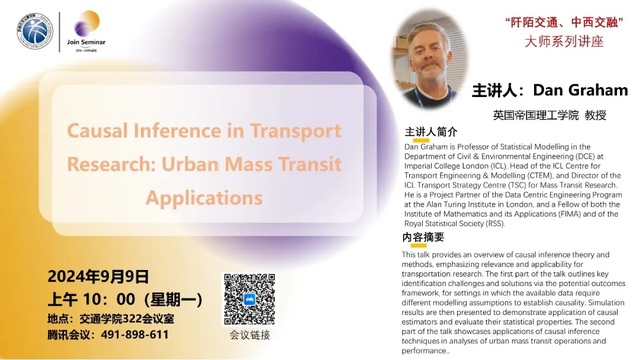
TIME
Sep 9th, 2024
LOCATION
Room 322, School of Transportation
Tencent meeting: 491-898-611
The lecturer: professor Dan Ggraham
Dan Graham is Professor of Statistical Modelling in the Department of Civil & Environmental Engineering (DCE) at Imperial College London (ICL), Head of the ICL Centre for Transport Engineering & Modelling (CTEM), and Director of the ICL Transport Strategy Centre (TSC) for Mass Transit Research. Dan coordinates the Data Science for Engineering Theme within DCE where he delivers lectures courses on mathematics, statistics, data science, transport modelling, and economics. He is a Project Partner of the Data Centric Engineering Program at the Alan Turing Institute in London, and a Fellow of both the Institute of Mathematics and its Applications (FIMA) and of the Royal Statistical Society (RSS). Dan leads a research group working on statistical and mathematical modelling in transportation, with specific focus on causal inference. Key research themes include: causal inference methods and applications; data centric engineering; statistical modelling for performance analytics; mathematical modelling in operations, economics, and planning; and resilience, risk and safety analyses. Dan has published extensively in these fields, and he holds citation records for several of his papers. In addition to his academic roles, Dan provides public policy advice internationally and has served on expert and advisory panels to Governments arounds the world.
This talk provides an overview of causal inference theory and methods, emphasizing relevance and applicability for transportation research. The first part of the talk outlines key identification challenges and solutions via the potential outcomes framework, for settings in which the available data require different modelling assumptions to establish causality. Simulation results are then presented to demonstrate application of causal estimators and evaluate their statistical properties. The second part of the talk showcases applications of causal inference techniques in analyses of urban mass transit operations and performance. Four case studies are presented, covering: i. urban metro resilience, ii. near-capacity congested metro operations, iii. interventions to improve urban sustainability, and, iv. quantification of air quality impacts from mass transit improvements. Results show that causal inference can provide unbiased and consistent estimates of causal effects in non-experimental settings when interventions or exposures are non-randomly assigned. The talk argues that empirical analyses in transport research are typically conducted in this setting, and consequently, that causal inference has immediate and valuable applicability.